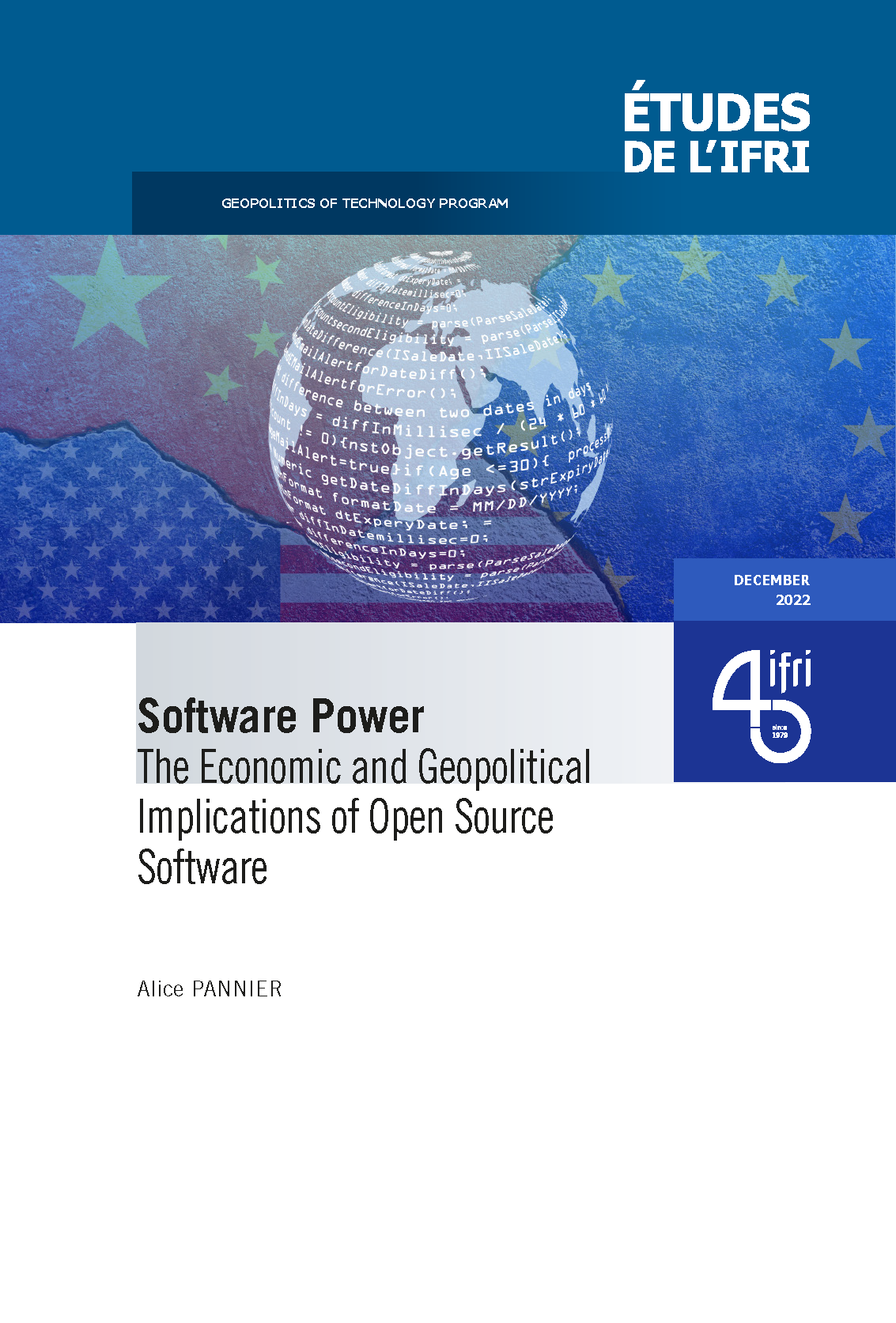Software Power: The Economic and Geopolitical Implications of Open Source Software

Open source is at the heart of the Internet infrastructure, of the software used by individuals or governments, and of the innovation processes of tech companies. Faced with threats to the security and sustainability of the open source model, governments are getting a hold of the topic, which is becoming increasingly geopolitical.

Open source plays a central role in software: it is the foundation of critical software bricks, and has become a major factor for companies’ innovation processes. It is also an attractive alternative to proprietary solutions.
However, open source is a victim of its own success. It suffers of a lack of resources dedicated to the maintenance of open source components, even though vulnerabilities in open source code can have serious consequences, as illustrated by the Log4Shell vulnerability in December 2021.
Private companies have been investing ever more money and human resources in the development and maintenance of open source software, and have acquired structuring roles in the governance of the ecosystem. This support, however, is not without risk for the open source ecosystem, which is increasingly shaped by the private interests of Big Tech companies.
Meanwhile, governments are getting increasingly concerned with the cybersecurity implications of open source software, and with risks of accidental vulnerabilities, and of manipulation of codes by criminals and foreign agents.
An analysis of the United States, Chinese and European cases show that government involvement in open source is not only pragmatic; it is increasingly politicized, and serves to uphold governments’ ambitions for national security, international influence, or digital sovereignty. The study highlights the dilemmas that emerge, for public authorities, from the tensions between the desire to secure universally used, critical open source components, the desire to develop “sovereign” technologies, and the risk of encroaching on the horizontal and decentralized functioning of open source.
This publication is also available in French: Sources d'influence. Enjeux économiques et géopolitiques des logiciels open source

Available in:
Regions and themes
ISBN / ISSN
Share
Download the full analysis
This page contains only a summary of our work. If you would like to have access to all the information from our research on the subject, you can download the full version in PDF format.
Software Power: The Economic and Geopolitical Implications of Open Source Software
Related centers and programs
Discover our other research centers and programsFind out more
Discover all our analysesAI, Data Centers and Energy Demand: Reassessing and Exploring the Trends
The information and communication technologies sector today accounts for 9% of global electricity consumption, data centers for 1-1.3%, and artificial intelligence (AI) for less than 0.2%. The growing energy demands of cloud services first, and now AI workloads (10% of today’s data centers electricity demand), have exacerbated this trend. In the future, hyperscale data centers will gain shares amongst all kinds of data centers and AI will probably account for around 20% of data centers electricity demand by 2030.
From nonproliferation to strategic competition: US export controls and China
Technological competition is at the heart of the renewed great-power competition that has characterized relations between the USA and China since the 2010s. The role of technological innovation in the evolution of power relations is already recognized in the literature of international relations. However, developments in US technology policy under the last two administrations raise the reverse question: how does the perception of changing power relations (in this case, Chinese technological catch-up perceived as a threat to US leadership) transform policies granting or denying access to technological innovation?
China’s Mature Node Overcapacity: Unfounded Fears
China is decoupling from, not flooding, the global mature-node semiconductor market. As China increasingly pursues industrial policies encouraging domestic chip production, its own growing chip demand will prevent a direct flood of cheap Chinese chips on foreign shores. However, as Beijing achieves its goal of decreasing the reliance of domestic downstream manufacturers on foreign chips, European and American mature-node semiconductor companies will feel the ripple effects of an increasingly “involuted” Chinese chip ecosystem.
Sat-to-Cell: Towards Universal Connectivity?
Sat-to-Cell is a new type of service that connects smartphones directly to satellites. It has recently enabled innovative applications such as emergency text messaging via satellite. The technology is developing rapidly, and many questions are now being raised about its potential impact.












